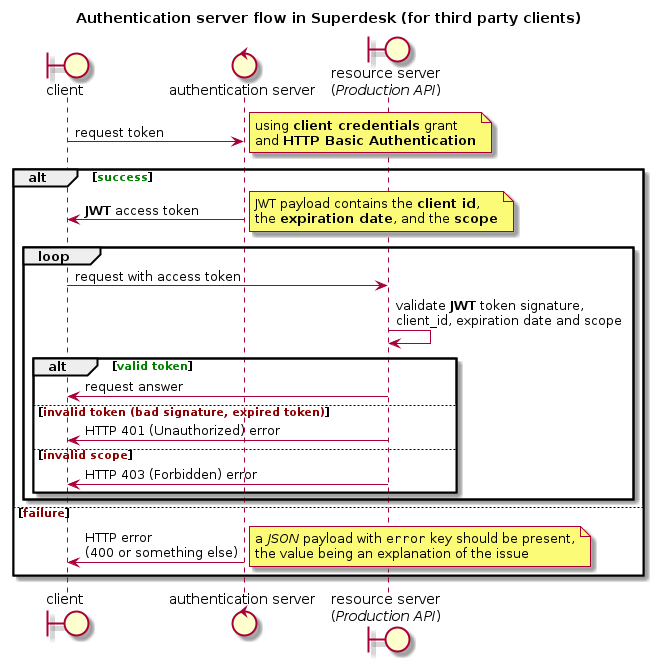Authentication Server¶
Superdesk provides an OAuth2 authentication server for the production API. The server is using the Client Credentials Grant with JWT access token.
The endpoint used in Superdesk is /api/auth_server/token.
Settings¶
The variables explained in the table below can be set, either as environment variable or
in settings.py.
Please note that for AUTH_SERVER_SHARED_SECRET we recommend to use environment
variable instead of settings to limit attack surface if a malicious user gains access to
your settings.
| name | explanation |
|---|---|
| AUTH_SERVER_EXPIRATION_DELAY | delay in seconds when the access token is valid, after this delay, a new token is needed. Default to 86400 (1 day) |
| AUTH_SERVER_SHARED_SECRET | a secret shared with resource server to sign/validate the access token. We recommend to set this value using environment variable. |
Allowing a client¶
A client needs to be registered with Superdesk authentication server.
You need to specify a client id, a password and the scopes allowed (see below).
This is done using python manage.py auth_server:register_client, please check the
appropriate documentation in Superdesk CLI section.
Scope¶
To interact with the production API, clients need to be explicitly allowed to perform
actions. This is done using the --scope argument when registering the client. The
possible values are:
| permission | explanation |
|---|---|
| ARCHIVE_READ | The client can read items from archive collection |
| DESKS_READ | The client can get desks metadata |
| PLANNING_READ | The client can retrieve planning items |
| CONTACTS_READ | The client can get contacts metadata |
| USERS_READ | The client can retrieve users |
| ASSIGNMENTS_READ | The client can retrieve assignments |
| EVENTS_READ | The client can retrieve events |
Access token¶
If client is allowed, an access token is generated and can be used to access the desired resources. The token is a JSON Web Token (JWT), which is signed, allowing the resource server to verify it.
The payload of the token will contain the following keys:
| key | explanation |
|---|---|
| client_id | id of the allowed client |
| iss | principal that issued the JWT, it’s always Superdesk Auth Server |
| iat | time when the JWT was issued (Unix time) |
| exp | expiration time (Unix time) |
| scope | list of allowed scopes (see above) |
Security¶
All the traffic must be encrypted using HTTPS.
The initial request is done by the client using HTTP Basic Authentication, meaning the password is going on the wire.
A salted hash of the client password is stored in superdesk, along with client id and scope.
The JWT access token is not stored, it is only validated by resource server by checking its signature.
The authorisation server and the resource server share a secret to sign and validate the
JWT Token. We recommend to use an environment variable instead of settings.py to set
this secret (the name of the variable is AUTH_SERVER_SHARED_SECRET).
Testing¶
By default, unsecured HTTP requests will be rejected. If you want to test authorisation
server with a local instance without HTTPS, you may set the AUTHLIB_INSECURE_TRANSPORT
environment variable in the shell where server is started:
$ export AUTHLIB_INSECURE_TRANSPORT=1
This is only for testing/development, do NOT do that in production.
To test locally a client token request, you can use curl:
#!/bin/sh
CLIENT_ID=0102030405060708090a0b0c
CLIENT_SECRET=789101112
URL=http://127.0.0.1:5000/api/auth_server/token
curl -u ${CLIENT_ID}:${CLIENT_SECRET} -XPOST ${URL} -F grant_type=client_credentials
You can check Authlib documentation for more informations.
CLI¶
You can manage tokens using Superdesk’s CLI. Check auth_server:* commands at
Superdesk CLI for details.
